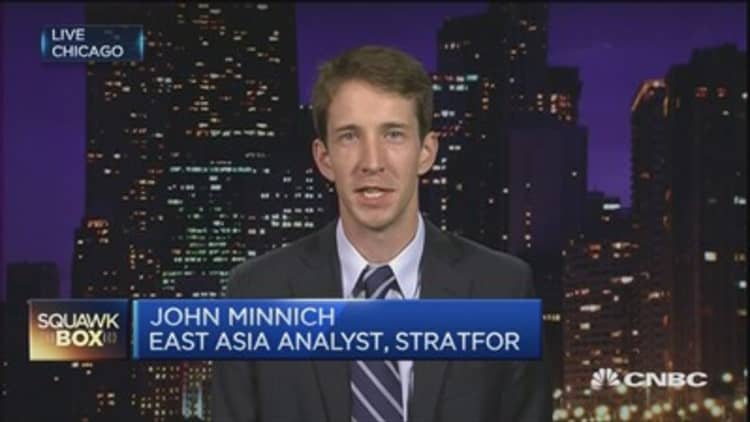Japan needs more economic stimulus to stave off a serious shock from China, according to one of Prime Minister Shinzo Abe's closest advisers.
Etsuro Honda, an architect of Abenomics in his role as special adviser to Mr Abe, said passing a supplementary budget to boost the stagnant economy was an "urgent task".
"I don't think we should call it a technical recession yet, but generally speaking, the Japanese economy is in a static situation," Mr Honda said in an interview with the Financial Times. "It is not growing positively."
Mr Honda's comments highlight the depth of concern in Tokyo about where demand will come from, as crucial export markets in Asia slow down, while consumers continue to struggle at home.
Mr Abe dropped a hint of further stimulus during a presentation to a group of investors at Bloomberg's New York headquarters on Tuesday, in which he declared the beginning of "Abenomics 2.0," a new phase of his signature package of economic, fiscal and monetary reforms.

When asked about the threat of a slowdown in China — Japan's biggest trading partner — by Michael Bloomberg, the former mayor, Mr Abe said that he was ready to respond.
"If, due to external factors, our economy experiences a major blow, then we will have a flexible economic management policy in place, so that we will be prepared."
During a prepared address, he said he was "determined, in co-operation with the [Bank of Japan], to do whatever it takes to put the economy on a robust growth track."
Read More Japan's August industrial output in surprise 0.5% fall
Gross domestic product fell at an annualised rate of 1.2 per cent in the second quarter, with consumption dropping by an annualised 2.7 per cent, and exports falling at an annualised pace of more than 16 per cent.
Data suggest that the third quarter will not be much better. Almost three years after Mr Abe came to power on a pledge to end two decades of on-and-off deflation, falling energy prices have brought the consumer price index to a standstill.
That has prompted many analysts to argue the Bank of Japan must expand its "qualitative and quantitative easing" at the end of October to maintain the credibility of its 2 per cent inflation objective.
More from the Financial Times:
Abe must keep focus on first three arrows
Japan pledge to boost GDP by 22%
Japan minister urges fiscal stimulus
"I am seeing more and more evidence that the Bank of Japan may need additional QQE," said Mr Honda. He said the output gap widened with GDP's fall and pointed to surveys showing a dip in public expectations of inflation.
Mr Honda said he had not made up his own mind and did not know what the BoJ would do. But he added: "They are considering whether they should move on additional QQE or not in a very serious way."
A former finance ministry bureaucrat, and now a professor at Shizuoka University, Mr Honda is one of the small clique of stimulus-minded economists who shaped Mr Abe's "three arrows" of monetary easing, fiscal stimulus and structural reform.
"I'm sure that something serious is happening in China," he said, arguing that a shift towards the service industry in China could not explain how far its imports have fallen, or other measures such as electricity consumption.
On top of China's slowdown, Japan is still suffering the ill-effects of raising consumption tax last year. "The negative burden of the consumption tax hike was concentrated in low-income households," he said. "They reduced consumption dramatically after the tax hike."
Putting the two together, he said the government should pass a supplementary budget, arguing that redistribution to deal with the effects of higher prices and stagnant incomes was a missing element in Abenomics.
"I really feel we need a supplementary budget, focusing on the real income shortage of mid and low-income households," said Mr Honda.
Read MoreAbe's new policy framework: More empty promises?
Another factor weighing on Japan's economy is plans for consumption tax to rise again, from 8 per cent to 10 per cent, in April 2017. Mr Honda said consumers were already anticipating the move.
"The prime minister himself declared it officially. We cannot change it so easily because of policy credibility, but from the economic point of view I am not so confident — mainly because of the Chinese issue and the protracted process of overcoming deflation.
"Some time in the future we need to start the [Bank of Japan] tapering process . . . but tapering should not coincide with the consumption tax hike, so the timing is very delicate."
Mr Honda said: "Definitely if something serious happens outside of Japan, like the Lehman shock, we cannot raise consumption tax. It would be suicidal.
"At this moment, all that I can say is 'I don't know'."

